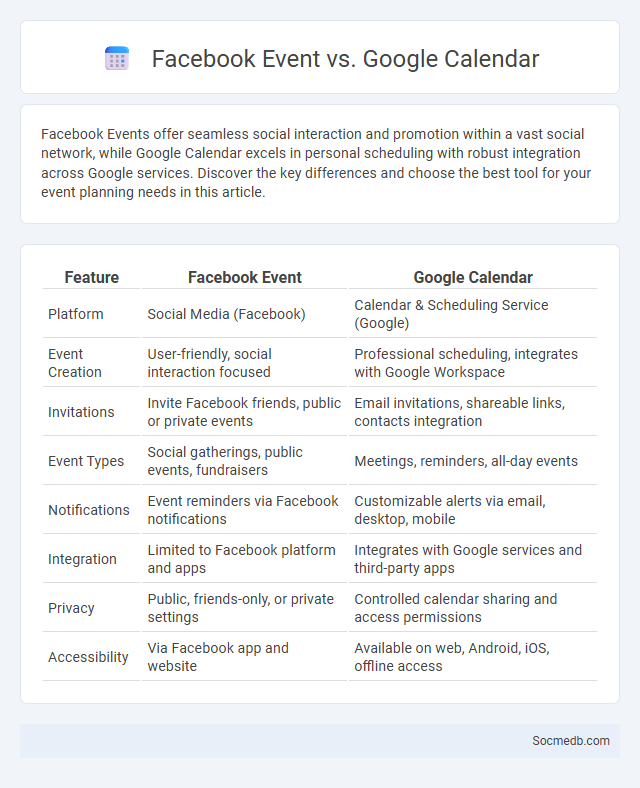
Photo illustration: Facebook Event vs Google Calendar
Facebook Events offer seamless social interaction and promotion within a vast social network, while Google Calendar excels in personal scheduling with robust integration across Google services. Discover the key differences and choose the best tool for your event planning needs in this article.
Table of Comparison
| Feature | Facebook Event | Google Calendar |
|---|---|---|
| Platform | Social Media (Facebook) | Calendar & Scheduling Service (Google) |
| Event Creation | User-friendly, social interaction focused | Professional scheduling, integrates with Google Workspace |
| Invitations | Invite Facebook friends, public or private events | Email invitations, shareable links, contacts integration |
| Event Types | Social gatherings, public events, fundraisers | Meetings, reminders, all-day events |
| Notifications | Event reminders via Facebook notifications | Customizable alerts via email, desktop, mobile |
| Integration | Limited to Facebook platform and apps | Integrates with Google services and third-party apps |
| Privacy | Public, friends-only, or private settings | Controlled calendar sharing and access permissions |
| Accessibility | Via Facebook app and website | Available on web, Android, iOS, offline access |
Introduction to Event Management Platforms
Event management platforms streamline the planning and execution of social media campaigns by offering tools for content scheduling, audience engagement, and performance analytics. These platforms enable you to efficiently coordinate event promotion, track attendee interactions, and measure the impact of social media efforts. Leveraging such technology enhances your ability to manage events systematically, boosting reach and engagement across multiple social channels.
Overview of Facebook Event
Facebook Event is a feature designed to facilitate online event creation, promotion, and management by allowing users to invite friends, track RSVPs, and share event details. Businesses and individuals leverage Facebook Events to increase engagement, boost attendance, and enhance community interaction through targeted invitations and real-time updates. Analytics tools provide insights into attendee demographics and engagement levels, optimizing event planning and marketing strategies.
Overview of Google Calendar Event
Google Calendar Event is a key scheduling feature that enhances social media management by organizing posts, meetings, and campaigns efficiently. It allows users to create, edit, and share events with detailed descriptions, reminders, and guest lists, ensuring timely collaboration and task tracking. Integration with other Google Workspace tools strengthens productivity, making Google Calendar Event indispensable for streamlined social media workflows.
Overview of Eventbrite
Eventbrite is a leading social media platform specializing in event management and ticketing services, enabling users to create, promote, and sell tickets for live events globally. The platform supports diverse event types, including concerts, conferences, and workshops, with features like integrated social sharing, real-time analytics, and seamless payment processing. Eventbrite's extensive user base and robust API integrations enhance event visibility and community engagement across major social networks such as Facebook and Instagram.
User Experience and Interface Comparison
The user experience on social media platforms varies significantly based on interface design, navigation ease, and content accessibility. Platforms like Instagram prioritize visual content with intuitive swipe gestures, offering a seamless and engaging user interface, while Facebook provides a more complex structure with numerous features that may overwhelm new users. Your optimal social media experience depends on how well the platform's interface aligns with your content consumption style and interaction preferences.
Event Creation and Customization Features
Social media platforms offer robust event creation and customization features that enable users to design, promote, and manage events with ease. These tools include customizable event pages, invitations, RSVP tracking, and integration with calendars to enhance user engagement. Advanced options such as targeted audience selection, multimedia attachments, and automated reminders streamline event planning and improve overall participation rates.
Audience Engagement and Promotion Tools
Social media platforms offer powerful audience engagement features such as interactive polls, live videos, and real-time comments that foster direct communication and community building. Promotion tools like targeted ads, influencer collaborations, and analytics dashboards help optimize your campaign reach and effectiveness. Leveraging these resources ensures you maximize visibility and strengthen your brand's connection with its audience.
Integration with Other Apps and Services
Social media platforms offer seamless integration with popular apps and services like calendars, messaging, and e-commerce, enhancing your overall user experience by streamlining communication and content sharing. This connectivity allows real-time synchronization of data across multiple devices, ensuring that notifications, events, and updates are consistently accessible. Optimizing your social media use with these integrated tools boosts productivity and engagement by centralizing information and simplifying workflows.
Pricing and Cost Analysis
Social media platforms vary widely in pricing models, typically offering free basic access with premium subscription options or paid advertising services. Cost analysis reveals that businesses investing in social media ads can expect expenses from a few cents to several dollars per click or impression, depending on targeting specificity and platform competitiveness. Understanding platform-specific pricing, such as Facebook Ads' auction-based system or LinkedIn's cost-per-click rates, is crucial for optimizing marketing budgets and return on investment.
Final Verdict: Choosing the Right Event Platform
Selecting the right event platform hinges on features like user engagement tools, scalability, and integration with social media channels such as Facebook, Instagram, and LinkedIn. Platforms like Hopin and Brella offer robust analytics and networking capabilities that enhance virtual and hybrid event experiences. Prioritizing compatibility with your target audience's preferred social media ensures maximum reach and interactive participation.
 socmedb.com
socmedb.com